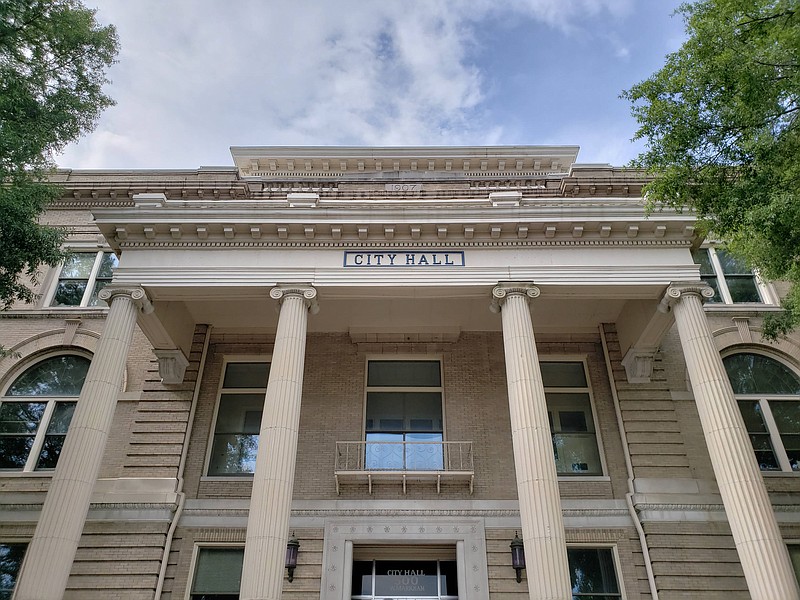Little Rock's finance director said the city expects to receive close to $19 million shortly as part of the first tranche of direct aid to cities authorized in the federal American Rescue Plan Act passed in March.
The pot of federal money has become the subject of some discussion among Little Rock officials and residents as the city weighs a referendum on a sales-tax increase, which has been delayed until at least the fall as a result of the city board tabling the package on Tuesday.
Some have argued Little Rock should wait to approve the tax package proposed by Mayor Frank Scott Jr. until the city receives guidance on how the federal funding can be spent.
Little Rock had not received the first tranche as of Wednesday, according to the city Finance Director Sara Lenehan. She told the Arkansas Democrat-Gazette she expects the funding to arrive within a week.
[CORONAVIRUS: Click here for our complete coverage » arkansasonline.com/coronavirus]
The pandemic-relief legislation signed by President Joe Biden included $350 billion for state and local governments nationwide as well as territories and tribal governments.
Arkansas will receive close to $2.6 billion, with $1.57 billion allocated for state government and the rest for local governments.
Just more than $76 million is expected to flow to Pulaski County. Among Arkansas cities, Little Rock will receive the largest portion of aid. According to Lenehan, Little Rock expects to receive $37,713,401.
With the first tranche meant to deliver half of the total funding, "$18,856,701 should be received soon," Lenehan wrote in an email Wednesday.
According to the U.S. Treasury Department, after the first half of funding is delivered to local governments beginning this month, the rest will be delivered approximately 12 months from now.
Funds can be used to support public-health initiatives, replace lost public-sector revenue, provide premium pay for essential workers, invest in water, sewer and broadband infrastructure and address negative economic effects of the pandemic, according to the Treasury Department's website.
"We are still receiving guidance from the U.S. Treasury that will likely be updated throughout the grant period," Lenehan wrote. "Funds will be expended over a period of four years 2021-2024."
According to Lenehan, the city's finance and grants personnel will review project requests to ensure they are eligible under the guidance. Projects expected to cost more than $50,000 must receive city board approval like any other city expenditure, she wrote.
Local elected officials have called for a closer examination of how the federal funding will affect the city's budget calculations before the adoption of Scott's tax proposal.
Scott's "Rebuild the Rock" package would institute a 1 percentage-point sales-tax increase that would raise the overall local rate to 9.625% and generate an estimated $53 million annually.
The revenue would fund a long list of new construction projects as well as initiatives in the arenas of community-oriented policing and early-childhood education.
At-large City Director Dean Kumpuris and Ward 3 City Director Kathy Webb have each raised the question of the American Rescue Plan money during discussions of the tax increase over recent weeks.
At a city board meeting Tuesday, Webb proposed delaying action on an ordinance to call a special election on the tax increase by two months, until the board's July 13 meeting. Scott had asked board members to call a July 13 election.
Her motion was approved in an 8-2 vote.
Kathy Wells, president of the Coalition of Little Rock Neighborhoods, on Sunday wrote to the mayor and city directors asking for a delay to any special election. In her letter, she raised the issue of the forthcoming federal aid.
"What are the guidelines for spending this one-time money?" Wells wrote. "Could this money be applied to some items on the list of capital projects to be funded by an increased sales tax? If this was done, what would you change in the proposed spending? It would be good to delay any election until this aid is distributed."
In a phone interview Wednesday, Wells said the neighborhood group was "very gratified there was a delay."
She suggested that during this period broad boundaries will be established for the federal funding, at which time city officials could "begin to match that up with the needs they have in front of them from their department heads and all the other city issues they've been discussing."
By way of example, Wells said the city might choose to use the one-time federal funding to offset the capital investment associated with building a new west Little Rock fire station, currently estimated at $8.5 million in the mayor's proposal, along with an $8 million operational expense increase over the next decade.
"If that comes off the sales-tax listing, what then changes on the sales-tax allocation?" Wells asked.
But Lenehan suggested there will be little connection between the federal funding and the sales-tax plan.
Although she said she has not had the opportunity to fully review the 151-page initial guidance from the administration, Lenehan wrote that "it is unlikely that there will be much if any offset to the proposed tax package."
"The Rebuild the Rock proposal is an ongoing plan. The [American Rescue Plan] funding is one-time rescue funding associated with the Pandemic that does not apply to ongoing programs or capital investments that do not address a specific need caused by the Pandemic," she wrote.
"For example," she added, "recipients must demonstrate that funding uses directly address a negative economic impact of the COVID-19 public health emergency, including funds used for economic or workforce development."
